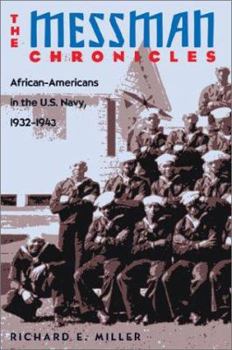The Messman Chronicles: African-Americans in the U.S. Navy,1932-1943
Select Format
Select Condition 
Book Overview
Despite racial discrimination and second-class status within the enlisted corps, the U.S. Navy's mess attendants, officer's cooks, and stewards compiled a proud legacy of combat service in World War II. The heroism of a few like Dorie Miller became well known to the American public, but most have long been forgotten. This book tells the story of those thousands of unheralded sailors of African descent who served in frontline combat with fellow messmen of Filipino, Guamanian, and Chinese ancestry from the first day of war to the last. Their story begins with recruit training in the racially segregated confines of Norfolk, Virginia's Units K-West and B-East during the 1930s and proceeds through the perilous early months of war. Though long disparaged as seagoing chambermaids and worse, they gallantly upheld the honor of their race while shedding their blood in full proportion in some of history's greatest naval battles. For this first major study of the subject, Richard E. Miller draws on a wealth of previously untapped primary documents and more than forty oral history interviews that he conducted. The men he interviewed served at the Naval Academy and aboard ships of all types prior to their wartime service. Miller focuses on the period from late 1932, when the Navy reopened its doors to black men, to 1943, when the ranks of the re-named steward's branch had grown and become transformed by the influx of wartime inductees. Collectively, the interviews cover nearly every naval campaign in the first two years of war. This unexplored perspective of the U.S. Navy puts a face on the greatest generation's last overlooked heroes while making a significant contribution to the operational, social, and cultural history of the U.S. Navy.
Format:Hardcover
Language:English
ISBN:155750539X
ISBN13:9781557505392
Release Date:January 2004
Publisher:Naval Institute Press
Length:272 Pages
Weight:1.55 lbs.
Dimensions:1.3" x 6.3" x 9.2"
Customer Reviews
2 ratings
The Messman Chronicles: African-Americans in the U.S. Navy, 1932-1943
Published by Thriftbooks.com User , 18 years ago
Richard Miller has bridge the gap between yesterday's Navy Messman rating to today's Culinary Specialist rating. He has spent a huge amount of time to "uplift the veil" of our military's unsung heroes. Heroes who fought the enemy abroad, and fought the enemy within their own country The beauty of this book is that it links the naval heritage of Sailors who are currently Culinary Specialists and/or are Filipino, Guamanian, and African American. A person gets to see through the experiences of others the true reality of serving one's country during the 1930's and 1940's depending on one's race, creed, color, or sex. This diverse group of Americans can easily be seen in today's ranks in the Navy's Culinary Specialist rating. One can trace the impact the past has had and the impact it holds in the future. Lessons for the future are available in this book in regards to the allowance of creating a "sub class culture" in the Supply ratings. Out of my 16 years of faithful, dedicated service, "The Messman Chronicles", by Richard Miller has been the most important book I've ever read since enlisting in the United States Navy. Before I enlisted, several veterans in my community were displeased of my choice to become a Mess Management Specialist (Culinary Specialist). I never knew of "their" story and couldn't understand their remarks or their concerns for my future welfare. As I advance through the ranks I began to understand what truly happened to them during their time of service. I could also understand why some of them are still bitter and resentful. I've decided to mend the gap of a generation misunderstanding, but more importantly I've chose to unselfishly show appreciation for a group of Americans who have not yet received their honor or recognition for their service to their country, their leadership, their commitment, their bravery, their dedication, their teamwork, and their professionalism that were displayed under the most extreme conflicting working environments and social settings. These Sailors stood tall, by living up to our current Sailor's Creed. Their story is a testimony of what our Nation's Flag represents in structuring freedom, equal rights, and civil liberties. Those of us serving in the Navy find it very hard to express the picture we see during our years of service. When you finish the last page of "The Messman Chronicles", you will realize that "the watch" you are standing was better prepared and is a little more comfortable due to the prior generation. We must never forget their "whole story", the good and the bad. We must pass their story to the next watch for proper turnover. They stand relieved and have struck below. We now have the watch! CSCS(SW) Thaddeus T. Wright Force Culinary Specialist Code: N411C2 1430 Mitscher Ave Norfolk, Va 23551-2494 Office: (757) 836-3173 DSN: 836-3173 Cell: (757) 777-8116 Email(1): [email protected] Email(2): [email protected]
The Messman Chronicles: African-Americans in the U.S. Navy,
Published by Thriftbooks.com User , 20 years ago
Richard Miller has obviously spent a great deal of time finding and interviewing the messmen veterans and does a masterful job, by analyzing their often poignant personal accounts, of showing how multidimensional they are. Through insightful discussion, he shows the reader the role thousands of these men played in the desegregation not only of the U.S. Navy and the military, but of all of American society as a whole. I found the final section of the book, which dealt with Doris "Dorie" Miller - the messman who displayed valor aboard the battleship West Virginia during the attack on Pearl Harbor - particularly compelling for the way it showed how politics of that era manipulated that young man's action in order to drive desegregation. I look forward to Miller's sequel dealing with the messmen's branch during 1943 and after. There is also room for a chronicle of the Asian-Pacific Island comrades of the African-American messmen.





